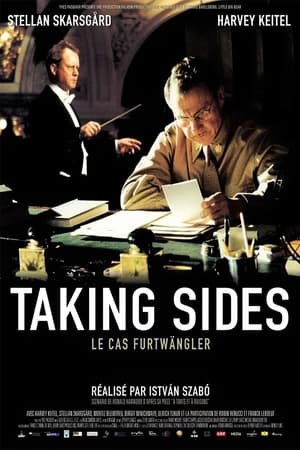Based on real events, the film depicts Futwengler, the German conductor and artistic director of the Berlin Philharmonic Orchestra, who gave way to the Nazis for a variety of reasons and took up the post of Nazi culture department. After the war, the United States investigated Futwengler's behavior in World War II, trying to find traces of Nazi thought on him. The man in charge of the investigation was American Major Steven Arnold, an insurance investigator before the war, who knew nothing about Futwengler. When he saw the video of the crimes committed by the Nazis in the concentration camp, he was shocked by the dismal scene, so he launched his investigation into Futwengler with a firm attitude of punishing the sinners. Throughout the investigation, Arnold was convinced that Futwengler was as guilty as the Nazis-because he performed for the Nazis and tried to find hard evidence. However, during the investigation, Arnold found that both of his aides had deep respect for the subject of the investigation, and many, including the Soviet colonel, an ally, had a favorable opinion of Futwengler. Faced with this situation, Arnold repeatedly played videos of the disposal of bodies in the concentration camp to strengthen his judgment. But it backfired. In an investigation of the rest of the orchestra, Arnold hair. Based on real events, the film depicts Futwengler, the German conductor and artistic director of the Berlin Philharmonic Orchestra, who gave way to the Nazis for various reasons and took up the post of Nazi culture department. After the war, the United States investigated Futwengler's behavior in World War II, trying to find traces of Nazi thought on him. The man in charge of the investigation was American Major Steven Arnold, an insurance investigator before the war, who knew nothing about Futwengler. When he saw the video of the crimes committed by the Nazis in the concentration camp, he was shocked by the dismal scene, so he launched his investigation into Futwengler with a firm attitude of punishing the sinners. Throughout the investigation, Arnold was convinced that Futwengler was as guilty as the Nazis-because he performed for the Nazis and tried to find hard evidence. However, during the investigation, Arnold found that both of his aides had deep respect for the subject of the investigation, and many, including the Soviet colonel, an ally, had a favorable opinion of Futwengler. Faced with this situation, Arnold repeatedly played videos of the disposal of bodies in the concentration camp to strengthen his judgment. But instead, in an investigation of the rest of the orchestra, Arnold found no evidence of Fortwengler's assistance to the Nazis, only to see that much of the hatred for the conductor stems from ignorance. In the end, he found that the "black-and-white" theory could not be applied to the conductor who insisted on performing his duties as an artist under the Nazi regime. At the end of the film, Arnold found no really strong evidence. When Futwengler opened, Arnold's assistant played the Symphony of Destiny.
 7.1
7.1